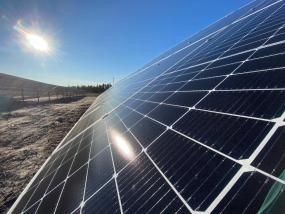Business Renewables Centre-Canada disappointed cloud of uncertainty continues for renewable energy industry

MEDIA RELEASE
CALGARY — JORDEN DYE, director of the Business Renewables Centre-Canada (BRC-Canada), made the following statement in response to the Government of Alberta’s announcement about new rules governing the renewable energy industry.
“The Alberta government has raised more questions with their supposed answers. This is not the level of detail the industry needs to make investment decisions. We are missing the key details companies require under just about every regulatory area they’ve announced new rules on: reclamation, land use and viewscapes.
“Corporations have invested $6.3 billion in power purchase agreements in the past five years in this province, but I expect the government has now essentially introduced a second “soft moratorium.” By introducing three new regulatory frameworks without details, investors and developers are left wondering what this actually means for their projects. Investors required certainty, and the government offered confusion.
“While details are needed across all categories, particularly concerning is the continued vagueness of the viewscapes requirements. Taken at face value, an unprecedented 35-kilometre buffer zone around all protected areas would eliminate 76 per cent of southern Alberta and would create a backdoor land ban. Any project that’s even close to a protected area, or what might be considered a protected area, can’t move forward until there’s certainty from the provincial government.
“We are now concerned that a portion of the $277 million in municipal tax revenues from planned wind and solar projects will not flow to 33 municipalities as originally projected by our recent analysis. Some of these projects may no longer be possible and others may be delayed or cancelled.
“The government's proposal on reclamation appears to be in line with what many in the industry have already been doing. We are pleased to see the flexibility in allowing landowner contracts to continue. We encourage the government to confirm that old contracts will be respected and grandfathered into the new system.
“Overall, today’s announcement extends the climate of uncertainty and leaves us with the task of analyzing how many projects and how much investment Alberta will lose to other provinces. Further details are needed to pin down exactly what the fallout will be. Failure to provide those details in a timely manner will also shift investment to other provinces and countries.”
Quick facts
“The Alberta government announced a seven-month moratorium on new renewable energy approvals on August 3, 2023. This pause in approvals is scheduled to end February 29, 2024, with the expiry of the Generation Approvals Pause Regulation. The AUC (Alberta Utilities Commission) was charged with conducting an inquiry by collecting input from the public and stakeholders. The AUC provided observations and options to the Minister of Affordability and Utilities on Module A of the inquiry prior to January 31, 2024, but that report was not made public.
Solar and wind projects overwhelmingly utilize low-value agricultural land, with 70 per cent of solar projects located on low-suitability agricultural land. No solar projects have been completed on high-quality agricultural land. (Low-suitability agricultural land is rated as classes 4-7 in the Land Suitability Rating System, used by the Alberta government to rate the suitability of land for agricultural spring-seeded small grains and hardy oilseeds.)
Between January 2019 and December 31, 2023, 3.26 gigawatts (GW) of renewable energy have been purchased through corporate power purchase agreements, enabling a total of 4.1 GW of project capacity. This equates to 12,400 gigawatt-hours per year of energy provided, leading to the creation of:
6,214 jobs,
$6.3 billion in capital investment, and
production of enough energy to power 1.7 million homes.
Alberta municipalities were paid $28 million in tax revenues by wind and solar projects operating in their jurisdictions last year, according to BRC-Canada analysis. This is almost three times more than estimated in 2017. In addition, our most recent analysis shows that municipalities were due to collect $277 million annually by 2028 if all planned projects proceed.
Jorden Dye, director of the Business Renewables Centre-Canada, is available for comment.
Background
The Business Renewables Centre-Canada (BRC-Canada) is an initiative of the Pembina Institute. BRC-Canada exists to enable businesses and institutions to access renewable energy for their emissions reduction needs across Canada. This means working closely with buyers and developers of renewables and assisting them in shortening their learning curves as they figure out the best path to power purchase agreements. Our growing organization currently has about 60 participants from across all sectors of the Canadian economy.
-30-
Contact
Hanneke Brooymans (English)
Senior Communications Lead, Business Renewables Centre-Canada
587-336-4396
Background
Infographic: Alberta’s Clean Energy Future: Municipal Renewable Tax Revenue at Risk?
Media release: Are growing municipal tax revenues from renewable energy at risk?
Blog: (Agrivoltaics) Solar farms and sheep show the makings of a clean energy classic duo
Blog: (Reclamation) A circular economy for rectangular solar panels
Statistics: See our Deal Tracker web page for quarterly updates on community benefits
